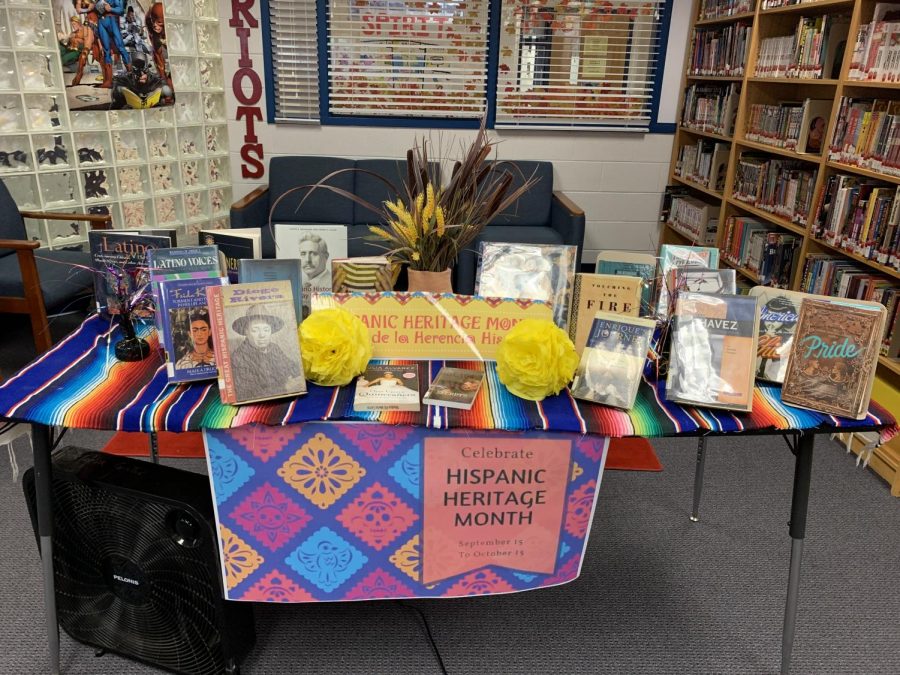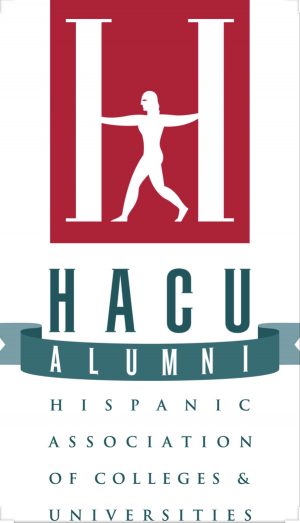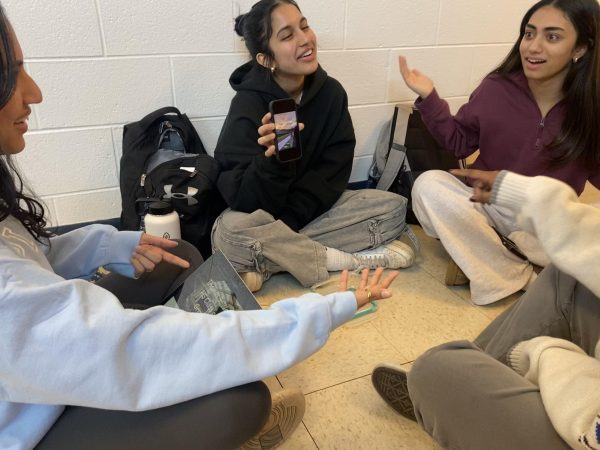Celebrating Hispanic Heritage Month
Hispanic Heritage Month display in the Media Center.
In the U.S., Hispanic Heritage Month is celebrated from Sept. 15-Oct. 15 to honor and recognize Hispanic/Latinx contributions, influence and importance on American history and society.
Hispanic Heritage Week was introduced in 1968 by Congressman George E. Brown. In 1989, President George H.W. Bush declared Hispanic Heritage celebration to last for a full month. The month begins on Sept. 15 because it is also the Independence Day (from Spain) for Costa Rica, El Salvador, Guatemala, Honduras and Nicaragua. Chile, Belize, and Mexico also celebrate their Independence Days shortly following Sept. 15.
The term Hispanic refers to one’s culture and origin. Someone can be categorized as Hispanic if they are of Spanish-speaking descent. Paul Ortiz, author of “An African American and Latinx History of the United States,” said that the term Hispanic is alienating to indigineous and Afro-Latino communities “whose history includes deep resistance to the Spanish invasion and is not necessarily tied to Spain.”
Latino is used to describe someone who is descended from countries in Latin America. The recently popularized term “Latinx,” promotes gender inclusivity but has sparked controversy as it can be considered “linguistic imperialism,” with the U.S. pushing ideals on the Spanish language which do not “grammatically or orally correspond with it,” according to a student led research group at Swarthmore.
Hispanic-Latino Student Union President Alexis Chavez explained that both terms exclude a handful of countries (for example, people from Spain are not Latinx, and people from Brazil are not Hispanic).
Aside from contributions to food, music, and cinematic culture, Hispanic/Latinx people have contributed greatly to American history and economic flourishing from the beginning of American independence. Bernardo de Gálvez, the Spanish governor of Louisiana in 1777, assisted George Washington in battles with the British. Before becoming lawmakers, Tejano leaders José Antonio Navarro and Francisco Ruiz fought for Texas independence from Mexico in 1836. Cuba made significant monetary contributions to the U.S. for the Battle of Yorktown, and over half a million Hispanic/Latinx people served in the U.S. military during WWII.
In a landmark Supreme Court case, Mendez v. Westminster, it was ruled that California could not segregate schools on the basis of origin or language ability, which set a precedent for the later case of Brown v. Board of Education, which further prohibited racial segregation in schools.
Additionally, Hispanic/Latinx people are most likely to start a business as compared to other ethnic groups, according to theKaufman Foundation, and immigrants from Latin countries boosted the housing market by a $3.7 trillion from 2000 to 2010, according to The Americas Society, leading to substantial economic growth.
On Sept. 14, President Joe Biden and The White House issued a presidential proclamation on National Hispanic Heritage Month. In the proclamation, the U.S. public was reminded that “Hispanic heritage is American heritage.”
The brief addresses how this country is built upon immigrants and international cultural influence. Biden mentions the Hispanic community in relation to his Build Back Better plan, Paycheck Protection Programs, pathway to citizenship, and global vaccine distribution.
According to Pew Research, roughly half of this demographic have reported experiencing discrimination. Stereotypes, specifically regarding illegal immigration, are responsible for such discrimination, despite four out of five Hispanic/Latinx people in the U.S. being citizens, according to Pew. This month is an opportunity to recognize inequities faced by Hispanic/Latinx people in the U.S. and how we can take action to end racial prejudice.
Chavez said that Hispanic Heritage Month is a time for people to come together and celebrate achievements, celebrities, a shared culture, and “something we can be proud of.”
She also mentioned that anyone can join and be a part of the club, it’s “a place to learn more about the culture and have fun.”
Your donation will support the student journalists of Thomas S. Wootton High School. Your contribution will allow us to purchase equipment and cover our annual website hosting costs.
Ellie Reiter is a 2022 graduate.











